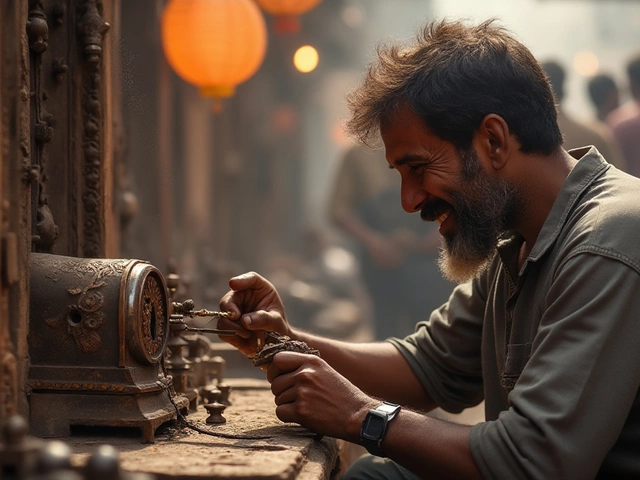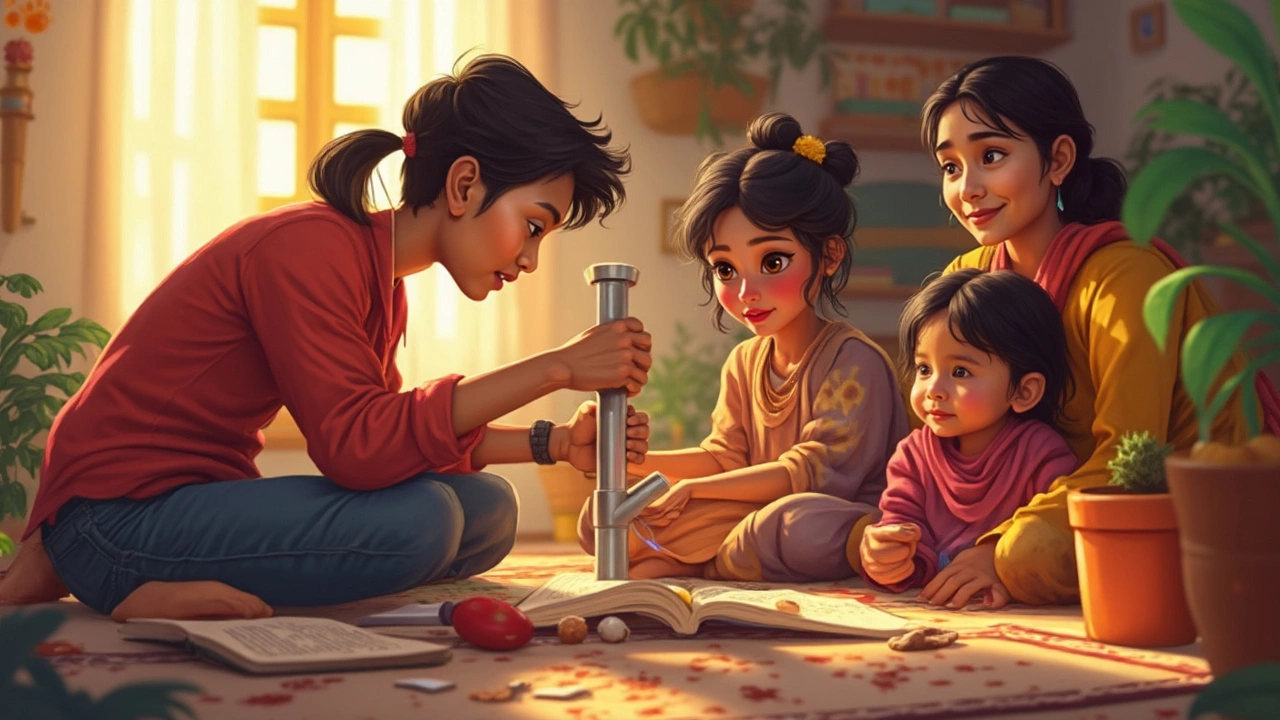Can Plumbing Be Self-Taught?
So, you're thinking about tackling plumbing on your own? You're not alone. With the rise of DIY culture and home improvement shows, more folks are wondering if they can swap their pipe dreams for real skills. But, is plumbing something you can actually teach yourself? Let’s find out.
To kick things off, it’s crucial to grasp some plumbing basics. This isn't just about understanding how water flows—it includes mastering the layout of pipes, knowing the tools of the trade, and following safety measures like a hawk. Without a solid foundation, DIY projects can turn from triumphant victories to costly disasters.
- Understanding Plumbing Basics
- Resources for Self-Teaching
- Pros and Cons of DIY Plumbing
- When to Call a Professional
Understanding Plumbing Basics
Let's kick things off with understanding the nuts and bolts of plumbing. At its core, plumbing is all about moving water. Sounds simple, right? But it goes way beyond that. It involves systems for water supply, drainage, and venting. Missing a single detail in any of these areas can spell trouble down the line.
One key fact: your home plumbing system is kind of like a tree. The main water line is the trunk, with smaller pipes branching out to supply water to different parts of the house. It's essential to know what’s flowing where and why.
Before diving into repairs or installations, it’s crucial to get comfortable with a few tools of the trade. Here’s a starter list:
- Pipe wrench – your go-to for tightening or loosening pipes and fittings.
- Plunger – a household hero. Never underestimate its power.
- Pipe cutter – for cutting through pipes swiftly and cleanly.
- Auger – when plungers just can't handle the clogs.
But there’s more to it than just tools and pipes. Understanding materials is another biggie. Plumbing pipes come in different varieties: copper, PVC, and even PEX piping. Each has its pros and cons, and knowing which to use when can save you a lot of hassle.
"Good plumbing is often invisible. When it's done right, you won't notice a thing," says Jane Smith, a respected plumbing expert. "But one mistake and it won't be just water leaking, it'll be money too."
Lastly, while it's fine to try your hand at basic stuff, always remember some jobs are best left to the pros. Messing with your home's plumbing without proper knowledge can lead to serious, costly issues.
To get a rough idea of how often these common plumbing issues occur, check out this table based on some industry stats:
| Plumbing Issue | Frequency in Homes (%) |
|---|---|
| Leaky Faucets | 41% |
| Clogged Drains | 27% |
| Running Toilets | 11% |
In the end, understanding these basics sets the foundation for any aspiring DIY plumber looking to learn on their own. Use this info wisely and always be prepared to call in the cavalry when things get too wet to handle on your own.
Resources for Self-Teaching
Alright, if you're pumped about getting into DIY plumbing, you need to know where to dig up the right resources. Good news—there are tons of options out there, thanks to books, videos, and even online courses.
To start, YouTube is a treasure trove for wannabe plumbers. You’ll find videos on everything from fixing leaky faucets to full bathroom remodels. Channels like "Plumberparts" or "This Old House" offer step-by-step guides that are easy to follow.
If you prefer something more in-depth, consider online courses from platforms like Coursera or Udemy. These courses are generally user-friendly and can give you a broader understanding of both basic and advanced plumbing techniques. Some even offer certificates you can brag about.
Books are another reliable resource. Titles like "The Complete Plumbing DIY Manual" are goldmines of information about both common and complex systems.
And definitely don't overlook forums like DIY Stack Exchange or Reddit's r/Plumbing. These communities are great for real-world advice and troubleshooting tips from people who’ve been in the trenches.
Here’s a quick list of some popular resources to get those gears turning:
- Plumbing Videos on YouTube: Practical guides and tutorials.
- Online Courses: Comprehensive lessons at your own pace.
- Plumbing Books: Detailed do-it-yourself instructions.
- Forums and Communities: Get help from experienced DIYers.
Remember, while diving into self-taught plumbing is exciting, it's important to combine these resources. Don't just stick to one type—mix it up for the best results.
You might want to keep this cheat sheet handy:
| Resource Type | Example |
|---|---|
| Video Tutorials | YouTube "Plumberparts" |
| Online Courses | Udemy Plumbing 101 |
| Books | "The Complete Plumbing DIY Manual" |
| Forums | Reddit r/Plumbing |
With these resources at your disposal, you'll be well on your way to conquering those plumbing projects. Just make sure you're always mindful of safety and know when to rope in a professional to avoid any catastrophes.

Pros and Cons of DIY Plumbing
Diving into DIY plumbing might seem like a great idea at first. After all, fixing that leaky pipe yourself could save you a good chunk of change. But like any DIY venture, there are ups and downs.
Let's start with the pros. First off, it can be incredibly rewarding to fix a plumbing issue yourself. That sense of accomplishment is unmatched. Plus, learning by doing gives you practical experience that can come in handy in future home dilemmas. As a bonus, handling some minor plumbing issues yourself can definitely cut down on costly service calls to professionals.
Another big pro is flexibility. Rather than waiting for a plumber's schedule to free up, you can get to work when it suits you. Think of it as controlling your own home maintenance timeline.
But, there are cons to consider. For one, the world of plumbing can be complicated. Even what seems like a small mistake can escalate into a more significant problem, costing even more than if you'd hired a pro in the first place. Common issues can involve incorrectly installed pipes leaking or even damaging your property over time.
A significant worry is safety. Mistakes with plumbing can lead to water damage, which hosts a slew of problems including mold growth—a serious issue for any homeowner. Not all plumbing work is created equal, and tasks involving gas lines or complex systems might be best left to those with professional training.
Also, there's the time investment to consider. While some repairs can be quick fixes, getting them done right can take longer than a simple weekend project. Plus, if you don’t have the right tools, the upfront cost of purchasing them can add up fast.
Considering these factors can help you decide whether a DIY plumbing approach aligns with your skillset, patience, and risk tolerance. Sometimes, it's wise to recognize when it's better to call in the experts.
When to Call a Professional
Alright, you've decided to take on DIY plumbing and probably managed a few fixes already. But there are moments when even the most enthusiastic DIYer knows it's time to dial up a pro. Let’s talk about those situations.
First up, gas lines. If your project involves anything to do with gas lines, call a professional plumber immediately. It's not just about avoiding mistakes; it's about safety. Mistakes can lead to hazardous leaks or worse. A senior plumber, Tom Harris, once said,
"Gas work isn't a DIY job. Safety should always come first—no exceptions."Thanks, Tom!
Another case is when water pressure mysteriously drops. Sure, a quick fix might be to check for leaks or clogged pipes, but if the issue persists, it’s time for professional intervention. They can spot and fix hidden problems that might not be obvious to an amateur.
- Complex installations: Installing new bathroom fixtures or redoing a plumbing system? Professionals ensure it’s done right, avoiding future headaches.
- Major leaks or floods: If there's water pooling quickly, it can cause damage fast. Plumbers have the tools and experience to manage these urgent cases.
- Building codes compliance: If you're modifying existing plumbing, you need to follow the appropriate building codes. Pros know these inside out.
Statistics from the Plumbing Manufacturers International show that plumbing tasks carry a significant risk of water damage if not done correctly, highlighting the importance of professional standards. Home insurance might not cover mishaps from DIY plumbing gone wrong, so think twice before diving solo into complicated projects.





